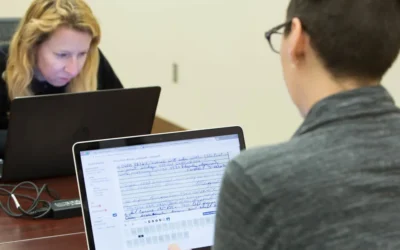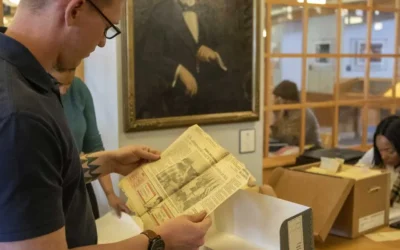Empowering Archivists through Project Management
Margot Note
Archivists play a crucial role in safeguarding history by preserving and providing access to invaluable records, but successful archival projects go beyond preservation.
Successfully managing archival projects also involves delivering projects on time and within budget, ensuring the efficient execution of initiatives. Archivists can apply fundamental principles to achieve project success, thus securing a rich heritage for future generations.
Agile project management is a flexible and iterative approach to managing projects that emphasizes adaptability and collaboration. It involves breaking down tasks into smaller increments or “sprints,” allowing teams to reassess priorities and regularly adjust based on feedback. Agile focuses on delivering incremental value to stakeholders throughout the project’s lifecycle, fostering a more responsive and efficient project execution process.
Agile project management principles have found a unique application in the archival field, revitalizing how archival projects are conceived and executed. In archives, where the preservation and accessibility of historical records are paramount, the agile approach offers a dynamic framework that accommodates the unpredictable nature of archival materials and evolving user needs. This methodology encourages iterative and incremental progress, allowing archivists to adapt their strategies based on ongoing feedback and discoveries. Archival teams can prioritize tasks, such as digitization, cataloging, and metadata creation, in alignment with changing priorities and emerging insights. By embracing flexibility and collaboration, agile project management empowers archivists to deliver more relevant and accessible collections, respond to unforeseen challenges efficiently, and safeguard heritage.
Clarifying Objectives
A well-defined set of objectives is at the core of every triumphant archival project. Before embarking on any initiative, archivists must take the time to identify the purpose, scope, and outcomes. Setting achievable goals is paramount, whether it involves digitizing historical records, organizing collections, or creating online access platforms. Clarity in objectives enables focus and ensures efficient allocation of resources.
A comprehensive plan is a roadmap to success for any archival undertaking. When collaborating with skilled professionals and stakeholders, archivists should develop a robust plan outlining tasks, timelines, and resource requirements. A well-structured plan considers potential challenges and establishes contingency measures. Reviewing and adjusting the plan as needed ensures staying on track and adapting to changing circumstances.
Optimizing Resources
Archival projects often demand meticulous allocation of personnel, technology, and finances. Archivists balance using available resources optimally and seeking additional support when necessary. Resourcefulness and efficiency in resource management are critical to staying on budget and achieving desired outcomes.
Effective communication is the backbone of any successful project. Archivists must communicate openly with team members, stakeholders, and partners. Regular updates on progress, challenges, and achievements foster a collaborative environment where ideas are shared and concerns are addressed. Strong communication enhances teamwork, boosts morale, and ensures alignment with project goals.
Mitigating Risks
Every project carries inherent risks that can impact its success. Identifying potential risks and developing mitigation strategies is vital for archivists. From technical challenges to budget constraints and unexpected delays, preparedness in addressing these risks empowers the archival team to respond swiftly and efficiently. A risk management plan allows the project manager to navigate potential pitfalls while remaining focused on the ultimate objective.
In the dynamic world of archival projects, flexibility is key. Archivists must be prepared to adapt to changing circumstances and embrace emerging opportunities. Incorporating new technologies and methodologies that enhance project efficiency and outcomes is essential. While adhering to the plan is crucial, being open to adjustments allows for greater agility.
Fostering Teamwork
Archival projects often involve multiple stakeholders, including researchers, donors, and community members. Effective project management necessitates fostering teamwork among these diverse groups. Encouraging participation and seeking input helps create a project that addresses their needs. Collaborative efforts lead to a shared sense of ownership and support for the project’s success.
As milestones are achieved and objectives are met, it is important to celebrate successes with the team. Recognizing team members’ and stakeholders’ efforts and contributions fosters motivation and camaraderie. Learning from any challenges or setbacks faced during the project is crucial. Documenting and analyzing lessons learned to inform future projects and lead to continuous improvement.
Lasting Legacy
Archivists can navigate the complexities of managing archival projects and nurture a legacy of archival excellence. Defining objectives, building plans, optimizing resource allocation, prioritizing communication, mitigating risks, embracing flexibility, fostering collaboration, and celebrating achievements are key to success. Effective archival management preserves historical records and strengthens cultural heritage. Archivists should apply these principles with dedication and passion, ensuring archival initiatives happen on time and within budget, leaving behind a legacy of preserved heritage.
Never miss another post. Subscribe today!
Similar Posts
Collaborative Archival Relationships
Collaborative projects are instrumental in showcasing how archival collections can benefit various organizational departments.
Informational, Evidential, and Intrinsic Values within Archives
Archives provide authentic, reliable information and hold values that reflect their functions and uses; informational, evidential, and intrinsic.
A Sustainable Archives
Archivists prioritize sustainable practices and policies, rooting their work in ethics of care, often preferring digital processing and preservation
Archival Branding and PR Strategies
Archivists who adopt branding and PR strategies both safeguard historical treasures and contribute to their organizations’ evolution.




Leave a Comment
Comments are reviewed and must adhere to our comments policy.
0 Comments